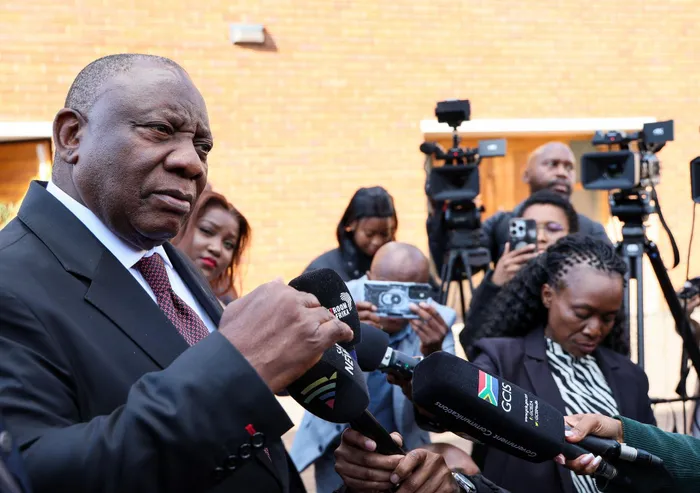National Dialogue Convention set to proceed amid concerns over costs
NATIONAL DIALOGUE

The first national convention of the National Dialogue is expected to go ahead on Friday despite growing concerns about the cost of the dialogue.
Image: Jairus Mmutle / GCIS
The first convention of the National Dialogue is expected to go ahead on Friday despite growing concerns about the cost of the gathering.
Intended to launch an extensive public dialogue process aimed at addressing the pressing socio-economic issues faced by citizens, the Convention is not without its detractors.
While the National Convention Organising Committee remains optimistic, critics have voiced significant concerns over the financial implications and the efficacy of such discussions amidst a backdrop of unfulfilled promises from previous government initiatives.
Political analyst Siyabonga Ntombela from the University of KwaZulu-Natal (UKZN) said that South Africa was not a nation in the true sense and meaning of the word.
“We are not even united in our diversity, plus we do not even have a unique identity that unifies us. Instead, we use race and classism to further divide us. Major corruption under a black government has made this cleavage even worse,” Ntombela said.
“Therefore, there is nothing new and unknown that will come out of this National Dialogue. People have spoken loud and clear as to what the government ought to do to create a prosperous South Africa. it will have a huge fiscal impact but nothing meaningful or transformational.”
According to a statement released on Monday by the Organising Committee, the first National Convention is tasked with several objectives: it will kickstart the process of engaging communities across the nation, identify key themes for discussion, and establish a Steering Committee to oversee future dialogue.
A total of 1 000 delegates, representing more than 30 sectors and over 200 organisations, have been invited to attend; however, only 755 have confirmed participation as of yesterday.
As citizens prepare for a gathering that hopes to ignite meaningful conversations about the country’s future, reactions from political analysts, economists, and trade union representatives reveal a spectrum of opinions about the initiative's potential.
Senior political science lecturer at the UKZN, Zakhele Ndlovu, remains sceptical.
“It is going to be another talk shop. Look at commissions of inquiry, their recommendations are never implemented. South Africans elect representatives to take the country in the right direction,” Ndlovu said.
“Actually, it is a distraction because we are now busy talking about it instead of holding our leaders accountable. In every election, South Africans continue to let their representatives get away with moving the country in the wrong direction.”
In contrast, Unisa economist Dr Eliphas Ndou contended that the dialogue offers an essential opportunity for citizens to shape policy. He believes that meaningful contributions could foster a prosperous future for all South Africans, provided that outcomes are translated into actionable reforms.
“The outcomes from the dialogue could result in formulation of policies that result in a prosperous future for all the South African people.”
The Congress of South African Trade Unions (Cosatu) has expressed its support for the National Dialogue, citing the dire socio-economic challenges facing the working class.
Cosatu's Parliamentary Coordinator Matthew Parks emphasised the necessity of mobilising society to address these issues and urges that any administrative hurdles should not delay the dialogue's progression.
“Whilst the Federation appreciates legitimate concerns outlined by the Legacy Foundations and other organisations, these can and must be addressed and the Dialogue proceeds as intended. If we wait for all issues; be it logistics, organisational or philosophical, to be resolved, we may find that time will simply run out,” he said.
Parks added that Cosatu will participate in the Dialogue as the many deep-seated socio-economic challenges facing the working class, the economy and the state, are such that they require the mobilisation of the entirety of society, including business to resolve
Meanwhile, the Federation of Unions of South Africa (Fedusa) acknowledged the urgency for a credible platform capable of fostering national consensus amid prevailing socio-political instability.
Fedusa said its support for the dialogue was contingent on its promise of enforceable reforms that could serve to renew public trust in governance.
“Our support for the Dialogue will be strategic, conditional, and measured strictly against its ability to deliver enforceable reforms. South Africa stands at a crossroads. The promise of the National Development Plan is faltering under the weight of high-level corruption, weakening public institutions, and the erosion of trust in democratic governance,” it said.
“The National Dialogue offers a potential moment of democratic renewal, but only if it moves beyond rhetoric and produces tangible, redistributive outcomes for workers and communities.”
BUSINESS REPORT